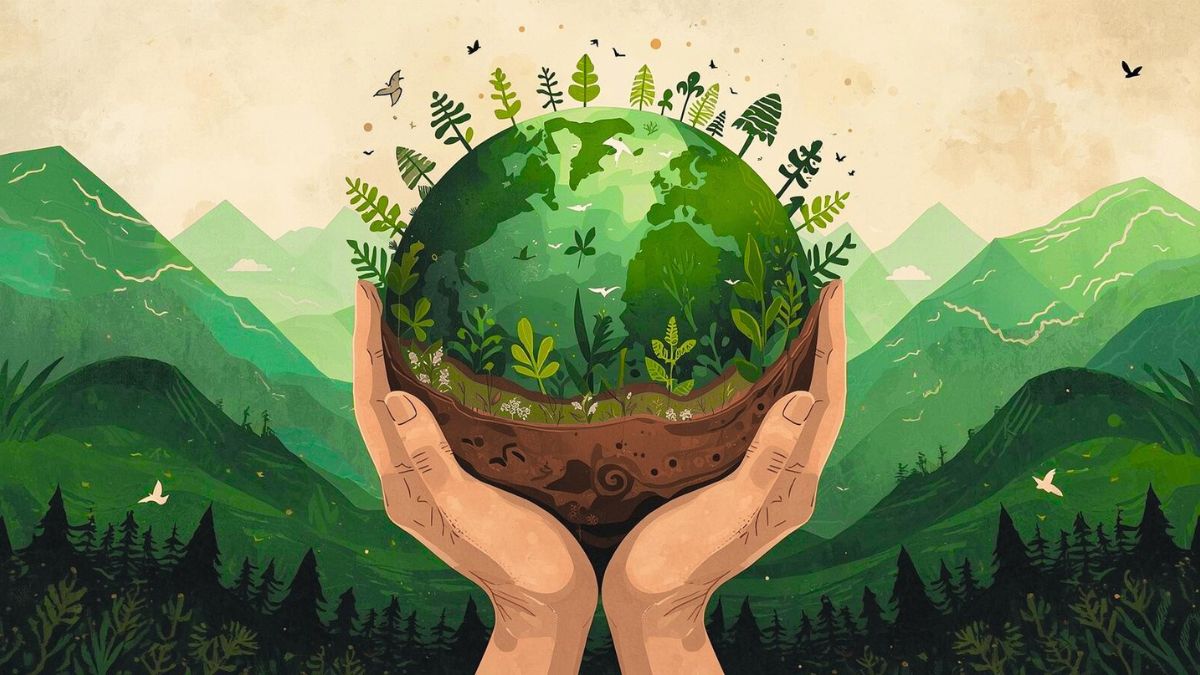Our Only Home: Addressing the Climate Crisis and Pledging for a Sustainable Future
The climate crisis is no longer something we can ignore or push to the side. It’s here, and its effects are being felt everywhere. From devastating storms to the slow disappearance of vital ecosystems, we are seeing the impact of our actions on the planet. The burning of fossil fuels, deforestation, and other harmful activities have pushed our planet to its limits, leading to a rapid rise in global temperatures and environmental instability. The reality is clear—if we don’t act now, we risk losing the balance of life that makes Earth our only home.
The phrase “There is no Planet B” has never been more powerful or urgent. It’s not just a catchy slogan, but a reminder of the truth we all must face: Earth is all we have. As we watch the climate crisis unfold, it’s hard not to feel a sense of responsibility to protect the planet for ourselves and for future generations. But there’s still hope. By making small, collective changes, we can help reverse the damage we’ve done and move toward a more sustainable future. From reducing waste to shifting our energy sources, every action counts in the fight against the climate crisis.
This is a challenge that can’t be solved by any one person, organization, or country alone. It’s a global effort, and it requires all of us to take responsibility for our part in it. We must pledge to make more sustainable choices in our daily lives, support policies that promote clean energy and conservation, and hold ourselves and others accountable for the future of our planet. The climate crisis is a call for unity, for working together across borders, industries, and communities to protect the place we all call home.
We’re at a crossroads, and the choices we make today will shape the world our children and grandchildren inherit. While the climate crisis is overwhelming, we have the power to make a difference. By committing to action now, we can ensure a future that is not just survivable but thriving. The climate crisis demands urgency, but it also offers a chance to rethink how we live and how we treat our planet. The time to act is now, and together, we can build a sustainable future for our only home.
The Far-Reaching Impacts of the Climate Crisis Across Key Sectors
The climate crisis is a multifaceted challenge that affects every sector of society, from the economy to public health, agriculture, and beyond. Its impacts are wide-reaching, and addressing them requires understanding how climate change disrupts various aspects of our lives. Each sector faces unique challenges, but all are interconnected in the broader fight for a sustainable future. In the following sections, we will explore how the climate crisis is impacting key sectors and the urgent need for action in each.
1. The Impact on Ecosystems and Food Security
One of the most significant consequences of climate change is its impact on ecosystems. Rising temperatures, altered precipitation patterns, and extreme weather events are threatening biodiversity across the globe. Ecosystems are struggling to adapt, leading to disruptions in food chains, habitat loss, and increased vulnerability for numerous species.
One of the critical impacts of climate change is its profound effect on global food security. Rising temperatures, altered precipitation patterns, and extreme weather events disrupt agricultural systems worldwide. Citing studies from reputable sources like the Food and Agriculture Organization (FAO) and the World Health Organization (WHO), we explore how these changes jeopardize food production, leading to increased hunger and malnutrition.
2. Rising Sea Levels and Climate Change
As global temperatures rise, polar ice caps and glaciers are melting, contributing to the rise in sea levels. Coastal communities are particularly vulnerable, facing increased risks of flooding, erosion, and the loss of vital infrastructure. Urgent measures are needed to protect these areas and mitigate the potential humanitarian crises that may arise. The concerned governments should take the extreme measures in protection of those vulnerable rural segments ensuring that those particular communities are part of sustainable human development as the states and governments pledge towards achieving the ‘Sustainable Development Goals’ by 2030.
3. Our Planet on the Brink: Extreme Weather Events and Climate Change
The fingerprints of climate change are quite visible with the frequency and intensity of extreme weather events, such as hurricanes, droughts, earthquakes, floods and wildfires which have escalated in recent years. These events pose a direct threat to human lives, infrastructure, and agriculture. In addition, these disasters not only devastate communities but also strain resources, exacerbating existing vulnerabilities to human lives. Developing resilient systems and adopting sustainable practices are essential to minimize the impact of these disasters.
4. Global Carbon Footprint
The burning of fossil fuels releases vast amounts of carbon dioxide into the atmosphere, a major contributor to the greenhouse effect. Transitioning to renewable energy sources, such as solar and wind power, is crucial in reducing our collective carbon footprint. Governments, businesses, and individuals must work together to accelerate the shift towards a sustainable energy future and protect the environment for the present and future generations.
5. Health Impacts
The health impacts of climate change are profound and multifaceted, affecting communities worldwide. According to the World Health Organization (WHO), rising temperatures contribute to an increase in heat-related illnesses, such as heatstroke, dehydration, and cardiovascular complications. Changing precipitation patterns and extreme weather events heighten the risk of waterborne diseases, posing threats to clean water supplies and sanitation systems.
Additionally, the spread of vector-borne diseases, including malaria and dengue fever, is influenced by altered climate conditions, impacting vulnerable populations. Climate change exacerbates air pollution, further contributing to respiratory diseases such as asthma and chronic obstructive pulmonary disease (COPD). Moreover, disruptions to ecosystems and food production escalate malnutrition risks, especially in regions dependent on agriculture. The WHO emphasizes the urgent need for global action to address these health challenges, urging comprehensive strategies to mitigate climate change and enhance health resilience on a global scale.
6. Economic Impacts
The economic impacts of climate change are far-reaching, affecting industries, infrastructure, and overall global economic stability. Increased frequency and intensity of extreme weather events, such as hurricanes, floods, and droughts, lead to widespread damages to physical assets, disrupting supply chains and causing significant financial losses. Agriculture, a cornerstone of many economies, faces challenges with shifting weather patterns and altered growing conditions, impacting crop yields and food security. Rising sea levels pose a threat to coastal regions, affecting property values and leading to the relocation of communities, contributing to substantial economic costs.
Moreover, the health-related economic burden rises as the prevalence of climate-sensitive diseases increases. The need for adaptation measures, such as resilient infrastructure and sustainable practices, introduces additional costs, while the transition to a low-carbon economy presents both challenges and opportunities for various industries. The economic impacts of climate change underscore the importance of proactive mitigation and adaptation strategies to build resilience and foster sustainable economic development.
A Call to Action: Uniting for a Sustainable Future
As the climate crisis intensifies and threatens the very foundation of our planet, it has become clear that the time to act is now. We are at a crossroads, where the future of our environment and the well-being of future generations depend on the actions we take today. This is not just a matter of policy or technology; it’s a collective responsibility that spans across all sectors of society. The climate crisis is a global challenge that requires a united effort, involving governments, businesses, individuals, and institutions. Together, we must rise to the occasion and act decisively to secure a sustainable, resilient future for our planet. Below are the key calls to action needed to address this urgent crisis:
1. A Call for International Cooperation, Policy, and Advocacy
Climate change knows no borders. It affects every nation, regardless of size or wealth, and it requires a coordinated global response. International cooperation is crucial if we are to mitigate the worst impacts of climate change. Agreements like the Paris Agreement and the Kyoto Protocol represent the framework for global collaboration, but there is still much work to be done. Governments must strengthen their commitments and ensure that climate policies are both ambitious and actionable.
As we move forward, it is essential to establish robust monitoring systems to track progress, evaluate the effectiveness of climate policies, and share knowledge across borders. The exchange of best practices, scientific innovations, and lessons learned will empower decision-makers to take informed, proactive measures. Addressing the climate crisis requires a unified global effort, and it is essential that we continue to hold each other accountable in this fight for the future.
2. A Call to Respective Governments
Governments play a pivotal role in shaping the future of our planet. It is their responsibility to create and enforce policies that prioritize sustainability and climate resilience. Beyond making ambitious commitments at the international level, governments must take meaningful action within their own borders. This includes implementing policies that foster renewable energy adoption, encourage energy efficiency, and protect critical ecosystems.
Governments must also allocate sufficient funding to tackle climate-related issues such as disaster recovery, infrastructure resilience, and the protection of vulnerable populations. The time for empty promises and half-measures has passed—governments must act decisively and with urgency to curb the effects of the climate crisis. These actions will not only protect ecosystems but will also safeguard the livelihoods of countless people worldwide who are at risk from the impacts of climate change.
3. A Call to Businesses
Businesses are not just drivers of economic activity; they are key players in the climate solution. The private sector has a unique opportunity to lead the way in creating innovative solutions to the climate crisis. Companies must embrace sustainable business practices that reduce environmental impact and prioritize social responsibility. From shifting to renewable energy sources to adopting circular economy principles, businesses can make a meaningful difference.
The role of the corporate sector in tackling the climate crisis is crucial, and businesses must act as leaders in this movement. Moreover, consumers and investors can hold businesses accountable by choosing companies that prioritize sustainability and ethical practices. By aligning profit-making with planet-saving, businesses can help drive the global transition to a sustainable future.
4. A Call to Educational Institutions
Educational institutions hold the power to shape the minds of tomorrow’s leaders, innovators, and activists. By fostering a culture of environmental responsibility, schools and universities can help students understand the profound impacts of the climate crisis and inspire them to take action. Children and adolescents, as the future stewards of our planet, are uniquely positioned to drive change. Schools should integrate environmental education into their curricula and encourage students to think critically about sustainability and climate action.
By empowering young people as “change agents,” educational institutions can help create a generation of environmentally conscious individuals who are passionate about addressing the climate crisis. The knowledge and awareness imparted in classrooms today will shape the decisions and actions of tomorrow’s leaders, ensuring that sustainability remains at the forefront of global policy and practice.
5. A Call for Individual Action
While large-scale policy changes and systemic transformations are essential, individual actions play an undeniable role in tackling the climate crisis. Each of us has the power to make a difference by adopting sustainable practices in our daily lives. Simple actions like reducing waste, conserving energy, supporting eco-friendly products, and adopting a plant-based diet can collectively reduce our carbon footprint and contribute to a healthier planet.
Additionally, by advocating for climate action in our communities, we can help raise awareness and inspire others to act. Every individual effort, no matter how small it may seem, is a step toward a more sustainable future. When we all take responsibility for our own actions, the cumulative impact can be profound. The climate crisis demands collective action, and every contribution, from the smallest changes in our homes to larger efforts within our communities, counts.
Together, these calls to action—whether from governments, businesses, educational institutions, or individuals—form the backbone of our response to the climate crisis. It is clear that no one group can tackle this problem alone. But when we unite, we can create powerful, lasting change. The time for action is now, and we must all do our part to ensure that our planet, our only home, is preserved for generations to come.
Conclusion: A Pledge for Our Only Home – There Is No Planet B
The climate crisis has become an undeniable reality, a force that is already shaping the world around us. From the devastating wildfires to the extreme storms, the signs of our changing climate are impossible to ignore. These changes remind us of how fragile our planet truly is, and just how urgent it is to act. The time has come to come together to safeguard the very ecosystems that support life on Earth. This is not just about responding to a crisis; it’s about taking responsibility for our shared future. Our planet is our only home, and we must treat it with the care and respect it deserves.
This is the defining challenge of our time. Every individual, every community, and every government has a part to play in overcoming the climate crisis. No one can solve it alone. But together, we can begin to reverse the damage we’ve done. It’s not just about halting climate change; it’s about adapting to the changes already in motion and building a world that works in harmony with nature. From reducing emissions to protecting wildlife and investing in sustainable energy, there are countless ways we can all contribute. The stakes are high, and the climate crisis affects everything we care about: from our health and food security to our economy and the well-being of future generations.
In the face of this crisis, it’s vital that we make a pledge—not just for ourselves, but for the generations that will follow. There is no Planet B, and there is no backup option if we fail. But there is hope, and that hope lies in our collective actions. By coming together to make smarter choices, supporting policies that foster sustainability, and embracing new innovations, we can chart a path forward. Every effort, no matter how small, matters. This is a commitment to ensuring that the planet we leave behind is one that can continue to sustain life and nurture future generations.
We have the power to overcome the challenges posed by the climate crisis, but we need to act—now. The urgency is clear, and the future of our only home is in our hands. Let’s be the generation that rises to the challenge, unites for meaningful change, and protects this beautiful planet we call home. There is no time to waste, and the actions we take today will determine the world we leave for tomorrow. The climate crisis requires our immediate attention, and by acting now, we can shift the course of the future. Our collective responsibility is clear: every step we take today brings us closer to a future that values sustainability, resilience, and harmony with nature.
As we look ahead, we must also recognize that the climate crisis is an evolving challenge. What we do today will ripple into the future, shaping the planet for generations to come. Whether it’s through advocating for stronger climate policies, shifting to renewable energy sources, or simply making eco-conscious decisions in our daily lives, every action contributes to the larger solution. This is our moment to stand together, to take ownership of the climate crisis, and to work towards a world where the impact of climate change is mitigated, and our ecosystems thrive once again. The time for complacency is over; the time for action is now.
















